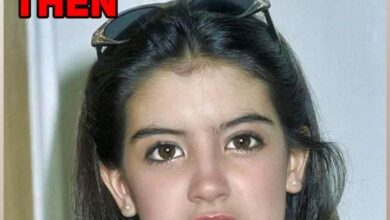I went into the garage just to grab an old toolbox!

I only meant to grab an old toolbox that morning. That was all. The garage wasn’t usually my domain—that was my husband’s space. He kept it in his own sort of order, and while it never looked especially tidy to me, he always seemed to know where everything was. I barely went in there. Something about it—the dim, flickering lightbulb, the shadows tucked into every corner—always made the space feel forgotten, like it belonged to something else entirely.
But that day was different. I can’t explain why, but something pulled me in. I walked along the wall, brushing past dusty shelves and aging boxes, heading toward the far corner near the old cabinet we’d been meaning to clear out for years. We used it for storing paint cans, cracked tools, and things we probably should have thrown away.
Then I saw it—something tucked just behind the cabinet, something that didn’t belong.
At first glance, it looked like a pile of old insulation or maybe a clump of dust. It was large and lumpy, coated in a dull gray-white fuzz that seemed too thick to be ordinary dust. But then it shifted—just a subtle twitch, like something breathing. I stopped cold. My breath caught. The air turned sharp and cold around me, and an involuntary chill rippled across my skin.
I stepped in closer, cautiously, heart racing.
What I saw made my stomach knot.
It wasn’t just a web. It was an entire structure—massive, elaborate, and eerily alive. Thick layers of silk and fibrous threads had been spun into a dense, swirling mass that stretched behind and beneath the cabinet. It was like some kind of cocoon, a fortress built with meticulous, haunting precision.
And it was inhabited.
Hundreds—possibly thousands—of tiny spiders scurried across its surface, weaving in and out of delicate strands like miniature workers on scaffolding. Some sat still, watching. Others darted in and out of shadowy crevices. I spotted clusters of eggs—milky white, fragile, waiting. It wasn’t a nest. It was a colony. A hidden, thriving world that had grown in the dark just steps away from where we lived our lives.
Oddly, I didn’t scream. I couldn’t. My body froze, paralyzed by the overwhelming sense that I had stumbled into something I was never supposed to see. My heartbeat thundered in my ears, and I stood motionless, afraid even the sound of breathing might attract them. And then—suddenly—I was running.
I burst out of the garage, slammed the door behind me, and stood in the daylight, clutching my chest like I’d just escaped something alive and hunting. I couldn’t go back. Not right away. For almost an hour, I paced, my mind trying to convince itself that I had imagined it, that I was overreacting. But I hadn’t imagined it. I knew what I had seen.
Eventually, I went back—but not alone. I brought my husband, still embarrassed by how shaken I felt. I told him what I saw in a whisper, half expecting him to laugh.
At first, he did.
But the moment he looked behind the cabinet, his expression changed. The color drained from his face. His jaw clenched. And I knew, without a word, that he saw it too—and that it was even worse than I had realized.
The web stretched farther than I’d noticed. Thin strands of silk laced across the shelves, clung to tools, even reached up toward the ceiling. The cabinet wasn’t just hiding a nest—it had become a sanctuary, a central hive of activity. The eggs clung like sinister pearls to the inside walls. And every little cobweb I had ignored over the months suddenly made perfect sense. This hadn’t happened overnight. It had been building.
I looked at my husband and murmured, “How did we live here and not notice?” The words felt foreign, detached, like I was describing someone else’s home.
But it was ours.
And we had unknowingly shared it with an entire ecosystem.
We called pest control immediately. The exterminators came the next day. Watching them tear down the nest, scrub away every trace, and treat every surface with chemicals brought a strange kind of relief. But it also cemented the reality of what had been there—what had lived just beyond our awareness. Even after it was gone, I couldn’t shake the image.
For days, I avoided the garage entirely.
The experience changed the way I saw that space. What had once been an afterthought—a storage area—now felt charged with a heavy presence. Even walking past the garage door made me pause. I’d think about what we’d missed, what we’d let grow unnoticed.
Because this wasn’t just about spiders.
It was a reminder.
A reminder that nature doesn’t need our permission to reclaim what we neglect. That life—wild, complex, and persistent—can thrive in the shadows, in the corners we overlook, in the quiet places we forget to check.
Even now, months later, I still hesitate before stepping into the garage. The exterminator assured us the infestation was fully cleared, but my mind drifts. I imagine movement just out of sight. Another nest forming, quietly, patiently. It makes me shiver.
What I learned that day was humbling. We like to believe we have full control over our homes, our spaces. But we don’t. The natural world is always there—waiting. Pushing at the boundaries. Crawling through the cracks.
Now, when I pass the garage, I don’t just feel fear. I feel awareness. A kind of respect—for the hidden lives that surround us, for what the world becomes when we stop paying attention, and for how easily the extraordinary can exist in the most ordinary of places.



